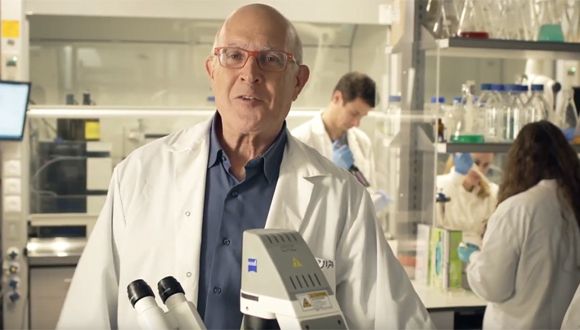The patent covers a vaccine-making process that targets the most vulnerable point in a coronavirus’ structure, representing a key step for any new vaccine.
By Yakir Benzion
The United States Patent and Trademark Office (USPTO) granted a patent to Dr. Jonathan Gershoni of Tel Aviv University for an innovative vaccine design for the corona family of viruses, the university announced Sunday.
Gershoni, a professor of biology at the university’s School of Molecular Cell Biology and Biotechnology, is one of the first to get a corona-related patent as researchers worldwide work overtime to develop potential vaccines and drugs to fight the pandemic.
Using Gershoni’s technique, the potential vaccine targets the novel coronavirus’s Achilles’ heel, its Receptor Binding Motif (RBM), a critical structure that enables the virus to bind to and infect a target cell.
According to Prof. Gershoni, the vaccine would reconstruct the coronavirus’s RBM, a tiny feature of its “spike” protein. Though the virus uses many different proteins to replicate and invade cells, the “spike” protein is the major surface protein that it uses to bind to a receptor — another protein that acts like a doorway into a human cell. After the spike protein binds to the human cell receptor, the viral membrane fuses with the human cell membrane, allowing the genome of the virus to enter human cells and begin infection.
“We have been working on coronaviruses for the last 15 years, developing a method of reconstructing and reconstituting the RBM feature of the spike protein in SARS CoV and subsequently in MERS CoV,” explained Gershoni. “The moment the genome of the new virus was published in early January 2020, we began the process of reconstituting the RBM of SARS CoV2, the virus that causes COVID-19, and expect to have a reconstituted RBM of the new virus soon. This will be the basis for a new vaccine, which could be ready for use within a year to a year and a half.”
The spike protein is quite large, containing about 1,200 amino acids. Some researchers have limited their research to a region of the spike known as the receptor binding domain (RBD) that comprises some 200 amino acids. However, the problem is that these relatively large areas have a variety of targets, and the immune system produces antibodies for all of them indiscriminately – reducing the effectiveness of a potential vaccine.
Gershoni cautioned that while his development is a first step, functionally reconstituting the RBM would be very challenging, but it would be an extremely effective basis for a vaccine.
“The smaller the target and the focus of the attack, the greater the effectiveness of the vaccine,” he said. “The virus takes far-reaching measures to hide its RBM from the human immune system, but the best way to ‘win the war’ is to develop a vaccine that specifically targets the virus’s RBM.”
The university filed another patent application after Gershoni’s research team completed their initial steps toward reconstituting the new SARS CoV2’s RBM, which could be used as a basis for a new vaccine.
“We should be able to isolate RBM-based vaccine candidates in the next month or two,” he said. “The discovery and production of a functional RBM for the new coronavirus is fundamental and critical for the production of the vaccine we propose.”
Gershoni concluded that successfully isolating a functional RBM would allow the pharmaceutical industry to incorporate it into a new vaccine. Such a vaccine could be produced in a few months, but would then need to be tested in clinical trials that could take up to a year.
